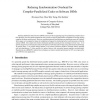Free Online Productivity Tools
i2Speak
i2Symbol
i2OCR
iTex2Img
iWeb2Print
iWeb2Shot
i2Type
iPdf2Split
iPdf2Merge
i2Bopomofo
i2Arabic
i2Style
i2Image
i2PDF
iLatex2Rtf
Sci2ools
103
click to vote
LCPC
1997
Springer
1997
Springer
Reducing Synchronization Overhead for Compiler-Parallelized Codes
Software distributed-shared-memory (DSM) systems providean appealingtarget for parallelizing compilers due to their flexibility. Previous studies demonstrate such systems can provide performance comparable to message-passing compilers for dense-matrix kernels. However, synchronizationand load imbalanceare significantsourcesof overhead. In this paper, we investigate the impact of compilation techniques for eliminating barrier synchronization overhead in software DSMs. Our compile-time barrier elimination algorithm extends previous techniques in three ways: 1) we perform inexpensivecommunication analysis through local subscriptanalysis when using chunk iteration partitioning for parallel loops, 2) we exploit delayed updates in lazy-release-consistency DSMs to eliminate barriers guarding only anti-dependences, 3) when possible we replace barriers with customized nearest-neighbor synchronization. Experiments on an IBM SP-2 indicate these techniques can improve parallel performance by 20% ...
Barrier Synchronization Overhead | Compile-time Barrier Elimination | Imbalanceare Significantsourcesof Overhead | LCPC 1997 | System Software |
Related Content
| Added | 26 Aug 2010 |
| Updated | 26 Aug 2010 |
| Type | Conference |
| Year | 1997 |
| Where | LCPC |
| Authors | Hwansoo Han, Chau-Wen Tseng, Peter J. Keleher |
Comments (0)

